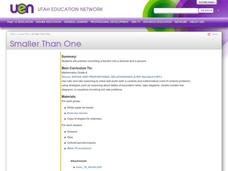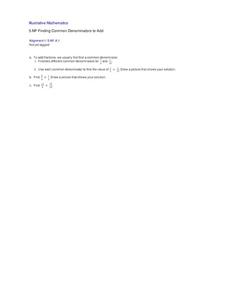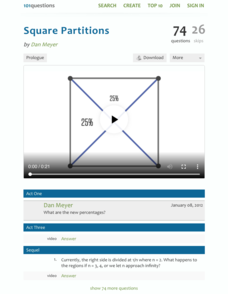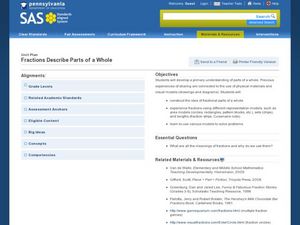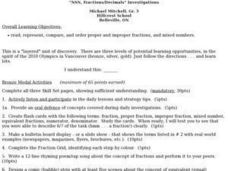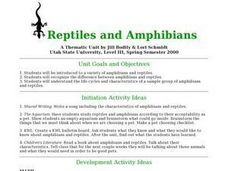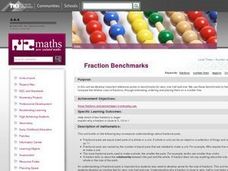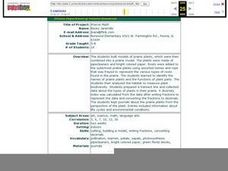Curated OER
Smaller Than One
Sixth graders practice converting a fraction into a decimal and a percent. They explain relationships among rational numbers. They order and compare whole numbers, fractions (including mixed numbers), and decimals using a variety of...
Illustrative Mathematics
Finding Common Denominators to Add
Finding common denominators is an important strategy when adding fractions with unlike denominators. In the first two questions in this three-question task, fifth graders are asked to combine fractions and draw a picture to show their...
Curated OER
Finding Common Denominators to Subtract
Subtracting fractions with unlike denominators can be overwhelming, but in this task, 5th graders work systematically to break down the procedure through three questions. The first two questions ask for pictures to be drawn along...
101 Questions
Square Partitions
Challenge your classes while developing their problem-solving skills. A square is divided neatly into four equal triangles by its diagonals until one diagonal is moved from a vertex to the midpoint of one side. Now, scholars must devise...
Pennsylvania Department of Education
Dividing with Fractions
Fifth graders explore the strategies to solve word problems using multiplication and division. In this problem solving lesson, 5th graders recognize the relationship between multiplication and division to solve problems. Students...
Curated OER
Oral Language in Mathematics
Third graders examine fractions by descriptively writing about them. In this number sense lesson, 3rd graders read number sentences and compare fractions based on their size. Students explain fractions to a friend by writing a friendly...
Curated OER
Ratio, Proportion And Percent
In this math worksheet, students evaluate and compare the ratios. They also compare the fractions by solving the proportions.
Curated OER
Place Value of Decimals to Hundredths: Diving for Decimals
Constructing decimals correctly is a crucial concept for elementary students to grasp. Here, have the young mathematicians in your class explore standard and expanded form while comparing decimal values. This unit is taught while...
Curated OER
Scale/Ratio
Investigate the use of ratios in scale drawings. Learners scale objects up or down using ratios then find the actual size of something using ratios. They apply their knowledge of ratios as they make their own telescopes in science...
Illustrative Mathematics
Buying Bananas, Assessment Version
Practice with unit rates, proportions, and ratios when Carlos purchases an amount of bananas. Learners must interpret a graph to decide whether points on the same line represent similar proportional relationships. Use with lesson plans...
Alabama Learning Exchange
Sky High
How are skyscrapers built? What does it take to make a structurally sound building? How can one work within a budget to complete a building project? These guiding questions will be investigated and answered within a hands-on lesson....
Illustrative Mathematics
Origami Stars
This one problem concentrates on the important concept of dividing a whole number by a unit fraction. Here, young mathematicians use pictures they draw to help answer this problem. Insight into the connection between multiplication and...
Curated OER
Capture the Circle (A Fraction Game)
Fourth graders compare and order fractions in a fraction game activity. In this fraction game lesson, 4th graders play a game that requires them to add fractions with like denominators and compare fractions. Students create posters where...
Curated OER
Fractions Describe Parts of a Whole
Third graders represent fractions as part of a whole. In this fractions lesson, 3rd graders use manipulatives to show how a fraction is a part of a whole. This lesson includes individual practice and an assessment instead of direct...
Curated OER
Fraction Conversion Lesson Plan
Students practice converting fractions into decimals and percents using a computer applet and the concept of money.
Curated OER
"NSN, Fractions/Decimals" Investigations
Fifth graders engage in a "layered" unit of discovery. There are three levels of potential learning opportunities, in the spirit of the 2010 Olympics in Vancouver (bronze, silver, gold). The lesson plan is based upon fractions.
Curated OER
A Fraction of the Cost
Students use various coin denominations to explore the concept of fractions. They demonstrate an understanding of the fractions 1/2 ($.50), 1/4 ($.25), 10ths ($.10) and 20ths ($.05) by using fraction circle pieces to create whole units...
Curated OER
The Anaconda
Students examine basic facts about the anaconda. They discuss the length of an anaconda, estimate the length of 33 feet, compare their estimate to the actual length, and decorate the paper snake with colored scales.
Curated OER
Tiling Tessellations
Students explore tessellations. In this shapes and geometry lesson, students describe the attributes of many of the shapes displayed on an Elmo. Students create examples of tessellations using pattern blocks.
Curated OER
Fraction Benchmarks
Learners investigate the fraction benchmarks for zero, one half, and one. They use these benchmarks to compare the relative sizes of fractions, through estimating, ordering and placing them on a number line. An assessment worksheet is...
Curated OER
Prairie Math
Students work together to build models of prairie plants. Using the model, they estimate the height and then measure them using metric and standard units. They write a fraction to represent their part of the whole set and compare and...
Curated OER
The Math Of African Music
Students practice rhythms and fractions on African drums in this Music lesson plan mixing Math skills and music notation. The lesson plan also includes ideas for assessment and state and national benchmarks met.
Curated OER
Shots, Standings, and Shopping
Rates and ratios can easily be applied to real-world situations. Learners explore a series of websites in order to procure comparable data. They define ratios and rates, view videos, and use the internet to explore how ratios and rates...
Curated OER
Capture/Recapture
Students use proportions to estimate the size of populations. They describe the data with using a graph or table of the estimate. Students use descriptive statistics to calculate mean, median, and mode. They also compare and contrast an...
